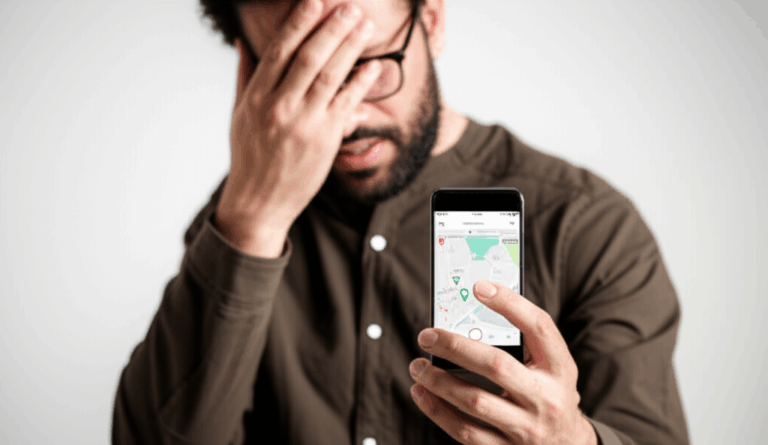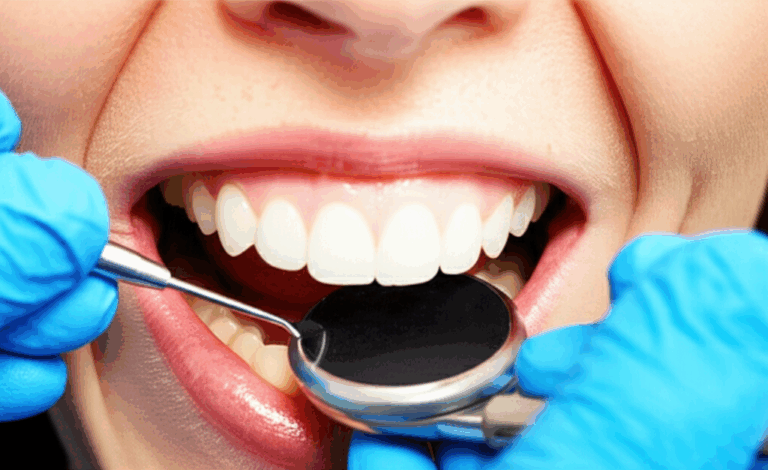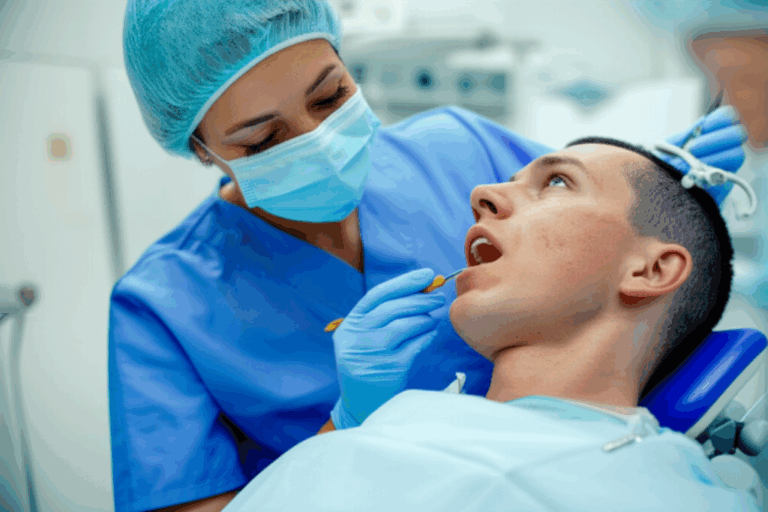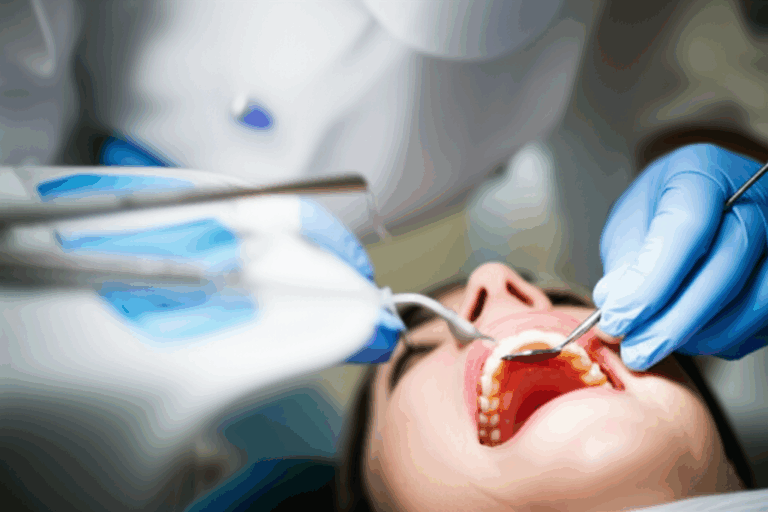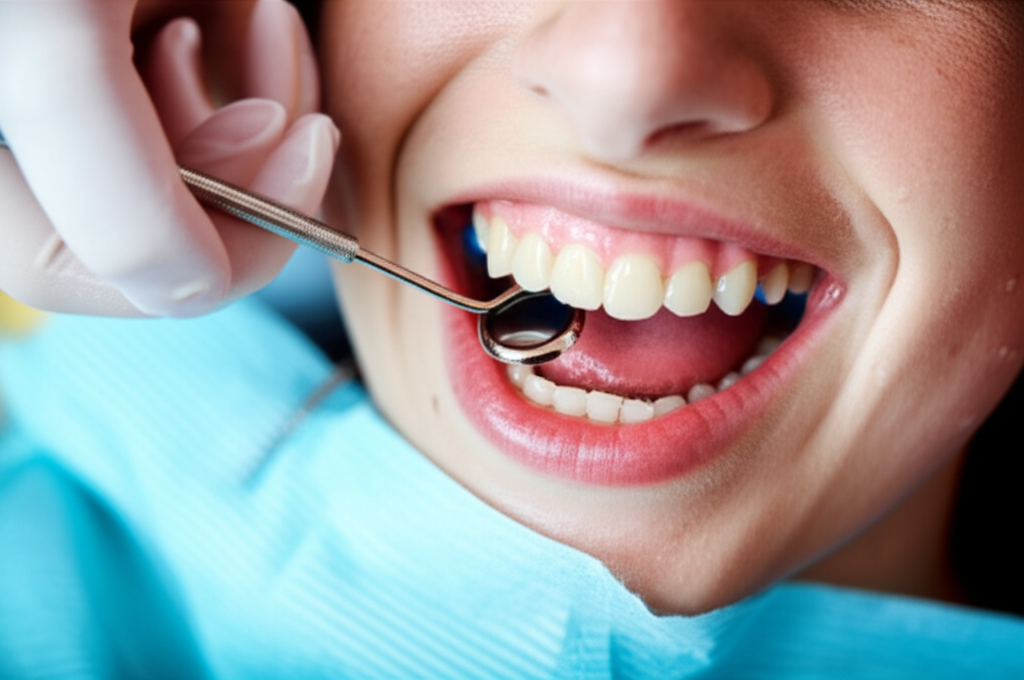
How Long Does Dental Numbness Last? Understanding Novocaine and Other Anesthetics
Dental numbness can feel strange, but it’s a normal part of almost every time you see the dentist. You might ask, “How long will my mouth feel numb?” In this easy guide, I’ll show you everything you need to know about how long dental numbness lasts. You’ll learn what to expect at the dentist, why some numbness sticks around longer, and what you can do to get feeling back sooner. Stick with me—I’ll share simple facts, real tips, and a few stories to make things clear.
Table of Contents
What Is Dental “Freezing” and Is It Always Novocaine?
Maybe your mom or dad said, “Don’t worry, the dentist will use Novocaine.” But here’s a secret: most dentists don’t use Novocaine anymore! Even though people still call it that, most dentists pick safer and longer-lasting numbing medicines like Lidocaine, Articaine, or Mepivacaine. So when you hear “Novocaine,” the dentist is probably using a different local pain medicine to make your mouth numb.
Why don’t dentists use Novocaine much today?
- Novocaine (Procaine) can cause more allergies.
- Newer kinds last longer and work better.
- Modern local anesthetics are safer for lots of people: kids, adults, and senior citizens.
The main idea? When the dentist “freezes” your mouth, it usually means some kind of local pain medicine that blocks pain during your visit.
How Does Local Anesthesia Work in Your Mouth?
Ever wondered what really happens when your mouth goes numb? Here’s what goes on.
Dentists use local anesthetics to stop nerve signals. Imagine your nerves are like telephone wires sending pain notes to your brain. Local anesthetics, such as Lidocaine, Articaine, or Bupivacaine, go in and “turn off” those wires by stopping sodium channels in your nerves. You can’t feel pain because those signals don’t get through!
Sometimes, they add something called epinephrine (adrenaline). It helps the numbing medicine stay in the spot longer and keeps bleeding down by making blood vessels tighter (that’s what a vasoconstrictor does).
How Long Does Numbness Last After the Dentist?
Here’s probably what you want to know most. You just want to feel normal again! While everyone is a little different, here are the usual times for when that numb feeling leaves:
| Anesthetic | Soft Tissue (Lips, Cheeks, Tongue) | Tooth Numbness (Pulpal Anesthesia) |
|---|---|---|
| Lidocaine (with epinephrine) | 2–4 hours | 1–2 hours |
| Articaine | 2–4 hours | 1–2 hours |
| Bupivacaine | 4–8+ hours | 2–3 hours |
| Mepivacaine (no epinephrine) | 1–2.5 hours | 30–60 minutes |
Upper jaw (maxilla) numbing usually wears off in about 1 to 2 hours. Lower jaw (mandible)—especially if you get a nerve block—can keep your lip and tongue feeling big for 3 to 5 hours, sometimes longer!
How long you’re numb depends on:
- Where the shot was given (infiltration vs. nerve block)
- The kind of medicine your dentist used
- How your body handles medicine
I remember, after a dentist visit, my lower lip sometimes felt puffy all afternoon, but the upper jaw numbness faded away super fast.
Why Does Upper Jaw Numbness Go Away Faster?
Let’s use a little picture: Think of your jaw bones like two different kinds of wall. The upper jaw (maxilla) is spongy and has lots of little holes. The lower jaw (mandible) is like a thick brick.
Upper jaw: It’s less hard, so the numbing medicine goes in and out of the tissues fast. That’s why your cheek or gum may only be numb for an hour or two after a filling at the top.
Lower jaw: The bone is thick and hard, so numbing medicine takes longer to soak in and takes longer to wear off—just like water soaks through a brick wall slower than a sponge wall. If the dentist gives you a nerve block, you can be numb longer, mostly in your lip and tongue.
So, when you get a shot in the upper jaw, feeling comes back quicker.
What Makes Dental Anesthetic Last Longer or Shorter?
Think about two kids eating ice cream. One is done quickly; the other takes ages. Your body goes through numbing medicine in the same way.
Things that change how long you stay numb:
- Type of anesthetic: Some work longer (like Bupivacaine); some leave fast (like Mepivacaine without epinephrine).
- Vasoconstrictors (like epinephrine): They make blood vessels tight, so the numbing medicine stays put and works longer.
- Dose and strength: A bigger shot or a stronger mix keeps numbness around more.
- Where the shot was given: A nerve block makes it last longer.
- Your own body: Some people break down medicine fast—some slow!
- How old and healthy: Kids usually lose the numbness faster because their bodies work faster.
- Swelling or infection: Sore or infected gums can make numbing medicine wear off sooner because it’s harder for the medicine to do its job in a sore area.
Once, I remember leaving the dentist and feeling my face come back to normal on just one side at first. It all depends on these things!
Does Everyone Feel Numb For the Same Amount of Time?
No! Even your family could notice they get feeling back quicker or slower than you.
Here’s what makes your after-dentist feeling unique:
- Genetics and your body: You get your body type from your family. Some just break down numbing medicine sooner.
- Blood flow: If you’re super active or nervous, your heart might pump faster, making the medicine leave your body sooner.
- Kids vs. adults vs. seniors: Kids often get feeling back sooner because their bodies move everything quicker. In grownups and older people, changes in blood flow or organs can make numbness last longer or shorter.
- Hormones and if you’re a boy or girl: Sometimes, your hormones can also affect how your nerves handle numbing medicine.
As Dr. Joe Dental, a dentist for over 20 years, always says, “No two mouths are the same. If your numbness takes longer or shorter than your friend’s, it’s usually not a big deal.”
What Should You Expect After Getting Numbed?
Once you get the numbing shot, you’ll notice some usual feelings:
- Heavy and tingly: Your lips, cheek, tongue, or gums can feel big or puffy—even if they look totally normal!
- Talking trouble: You might sound funny or drool a bit and not know it.
- Eating and drinking: You could bite your lip or cheek by mistake or spill water when you drink.
- No pain: That’s the best part—thanks to the numbing, you won’t feel pain during the dental work.
As the numbness goes away:
- You’ll feel tingling or pins-and-needles as feeling comes back.
- You might have a little soreness, especially if you had a tooth pulled or a filling close to a nerve.
- Most people are back to normal in just a few hours.
What If My Numbness Lasts Way Too Long?
Sometimes, the numbing hangs around for what feels like forever. You might wonder, “Is this normal? Should I worry?”
A little extra numbness usually isn’t bad, but here’s when to call the dentist:
- Still numb after 6–8 hours? It’s rare, but call the dentist to make sure.
- Strange tingling, electric shocks, or not being able to taste for a whole day—especially after wisdom tooth surgery? That might be paresthesia (nerve bothered by the shot). It’s not common but worth checking.
- Sometimes, the shot can nudge or stretch a nerve. Thankfully, most get better on their own in days or weeks.
TIP: If you’re worried or something feels really off, call your dental office! The dentist is happy to help.
Can I Make the Numbness Wear Off Faster?
No one wants to feel like a fish with puffed-up lips any longer than needed. Here’s what can—and can’t—help:
What really works:
- OraVerse: This is a special medicine the dentist can use to make numbness go away faster. It works by boosting blood flow so your body gets rid of the numbing medicine quicker. OraVerse can make numbness go away in half the usual time—but it’s not used everywhere and not always needed for small fillings.
What doesn’t really work:
- Moving your mouth, chewing gum, or drinking tons of water don’t make numbness go away much faster. But they might help pass the time.
- Walking or light activity: A soft walk may help a little by making your blood move faster.
What to skip: Don’t try to suck the numbness out or poke at your mouth with sharp stuff. That just causes hurts or bites.
If you have worry about your numbness, ask your dentist.
When Is Dental Numbness a Sign of a Problem?
Almost always, dental numbness is safe and only lasts a few hours. Still, if you notice these things, call your dentist:
- Your mouth, lip, or tongue is still numb the next morning.
- You have tingling, pain, burning, or loss of taste for a day or more.
- Your speech is weird all day.
- You have swelling, nasty taste, or bad pain in that spot.
- You see a rash or trouble catching your breath (rare allergic reaction).
Dr. Joe Dental says: “If something feels odd, let’s check it out. Most numbness wears off just fine. But it’s always good to be careful!”
Tips for Eating, Drinking, and Staying Safe While Numb
Now for the easy, real life part—how do you handle day-to-day stuff while your mouth is still numb?
Eating:
- Wait till all feeling is back before chewing anything chewy or hard.
- If you must eat sooner, choose soft foods like yogurt or pudding.
- Cut food into tiny chunks to avoid biting your cheek or lip.
Drinking:
- Sip slowly and maybe use a straw if your lips are numb.
- Skip hot drinks! You might burn your mouth and not even know it.
Talking:
- Go slow; you’ll sound a bit funny, but it’ll pass.
Brushing:
- Wait until you get feeling back, especially if you can’t feel your cheek or tongue. You don’t want to scrub too hard.
Going back to school/work/driving:
- You can drive when you feel like you have control of your lips and aren’t dizzy or sleepy. If you’re not sure, ask your dentist.
Frequently Asked Questions About Dental Freezing
Can I eat right after my mouth wakes up?
You should wait until numbness is totally gone before eating solid foods. If you eat too soon, you could bite your tongue or cheek.
Why is my lip still numb but my tooth isn’t?
This is common with a lower jaw nerve block. The feeling comes back to each part at its own speed. Usually, the tooth wakes up before the lip.
Are there side effects to dental numbing medicine?
Mild ones: sore where the shot was, a saggy feeling in your face, or a fat lip. Big allergic reactions are super rare. The dentist will always ask about your health and allergies first.
What’s the difference between Novocaine and Lidocaine?
Novocaine was the go-to a long time ago but isn’t used much now. Lidocaine is safer, works better, and almost never causes allergies. When people say “Novocaine,” they usually mean Lidocaine or one of the newer numb meds.
How long should I wait to drive after dental work?
If you only got local numbing, you’re good to drive once you feel steady. If you had medicine that made you sleepy, ask your dental team first.
Internal Links for More Dental Know-How
- Want to know how crowns and bridges are made? Visit this crown and bridge lab for simple guides.
- Curious about new dental tech? Check out this digital dental lab for the latest updates.
- Need more about tooth-saving options? Go to this implant dental laboratory for more info.
Key Points to Remember
- Dental numbness usually sticks around 1–5 hours, depending on where you were numbed, the medicine, and your body.
- Upper jaw numbing leaves sooner than the lower jaw, especially with a nerve block.
- Even though people say “Novocaine,” today’s dentists use new, safer numbing meds like Lidocaine or Articaine.
- Most people feel normal again after a few hours; if you’re still numb after 8 hours, call your dentist.
- Eat, drink, and brush carefully until you can feel your whole mouth—protect your cheeks, lips, and tongue.
- Call your dentist right away if you notice allergies, pain, big swelling, or strange symptoms.
- Your own numbness time is unique—so ask your dental team with any questions or concerns.
You’ve now got a simple, friendly roadmap to dental numbness and numbing medicine. When your next dental visit comes, you’ll feel ready and sure. And remember: Your dentist and team are your best helpers for a safe, easy visit—don’t be afraid to ask questions!
References
- Consulted and checked by Dr. Joe Dental, DDS
- Journal of Dental Research, 2022: “Local Anesthetic Duration and Patient Experience”
- American Dental Association: “Local Anesthesia in Dentistry” (2023)

